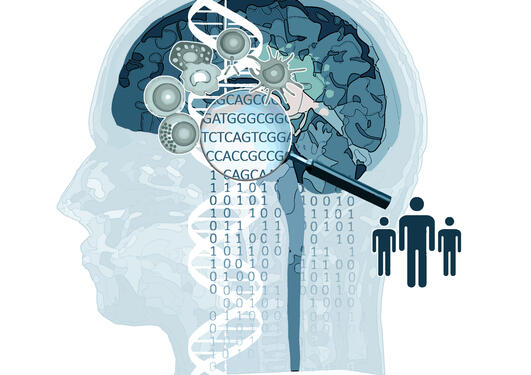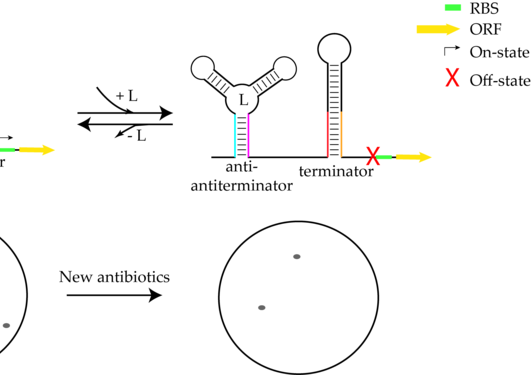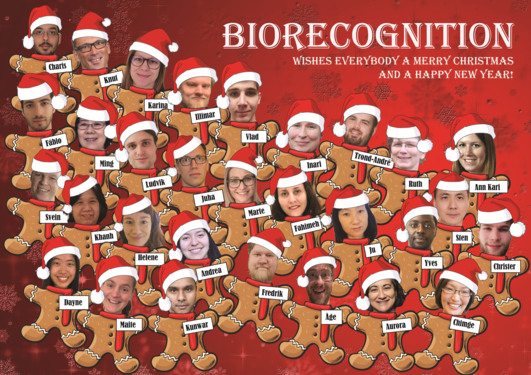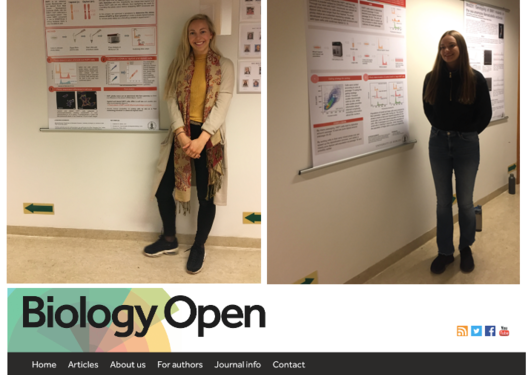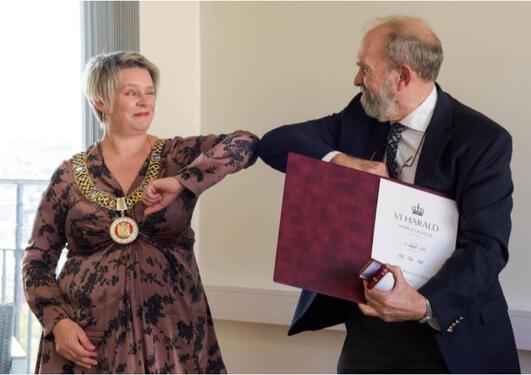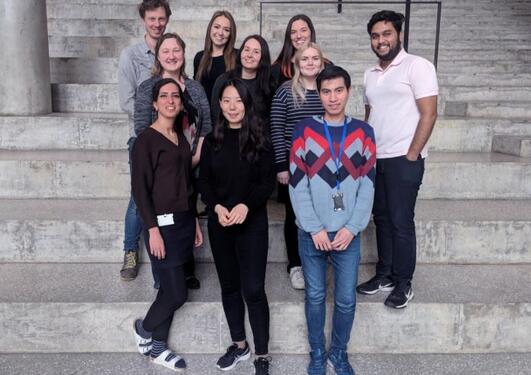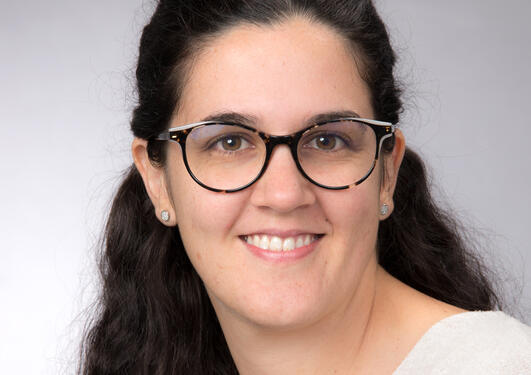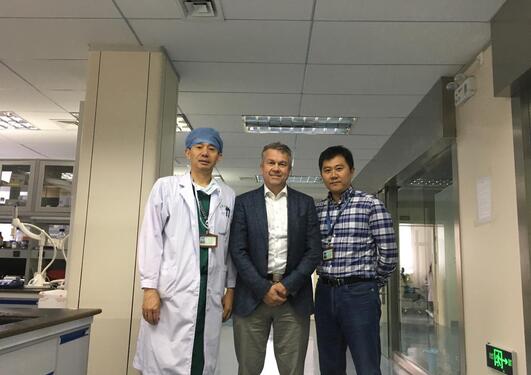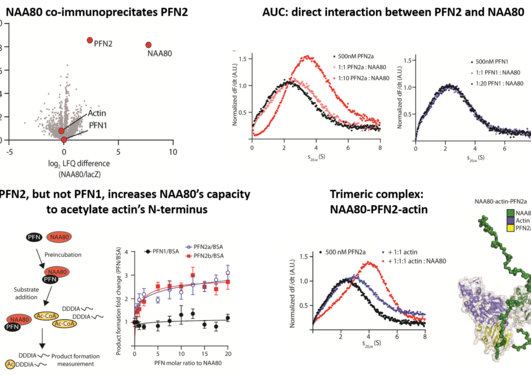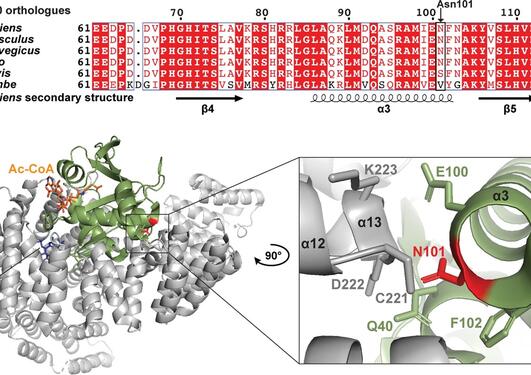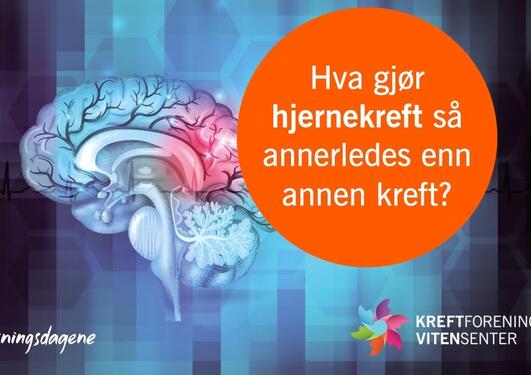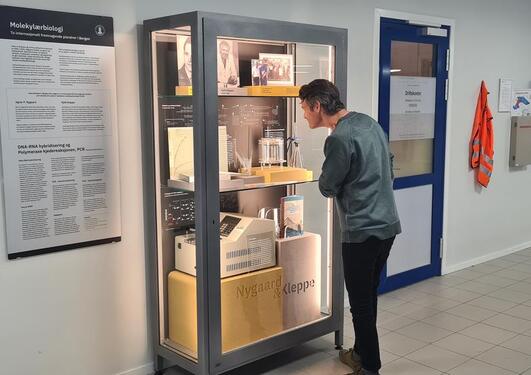News archive for The Department of Biomedicine
Carnosine plays an important roles as antioxidant, pH buffer, and neuromodulator and recently received increasing attention as biomarker for many disease states such as Alzheimer disease and Parkinson disease. The Neurotargeting group at the Department of Biomedicine discovered a novel enzyme, Glutamate Decarboxylase Like 1 (GADL1) that plays a role in carnosine production.
"Immunological, Molecular and Imaging Biomarkers of Malignant Progression in Brain Cancer: Improving Precision Neuro-Oncology"
Charcot-Marie-Tooth disease (CMT) is the most common inherited neuropathy in humans, linked to mutations in dozens of different genes. Two of these genes encode the proteins GDAP1 and NDRG1. We have solved the crystal structures of these two proteins, in order to better understand their structure, function, and involvement in disease.
Researchers at the Department of Biomedicine focus on large RNA structures in bacteria as a target for new antibiotics. Read the latest review article on riboswitches.
The Biorecognition Unit wants to wish everyone a Merry Christmas and a Happy New Year! :-)
The Norwegian Health Association supports the research lab around Helge Wiig who investigates if eating too much salt causes high blood pressure. Read a popular scientific article on forskning.no.
Gro Vatne Røsland is a researcher at the Department of Biomedicine and has written a popular scientific article summarizing current research regarding Vitamin D-intake and infectious diseases.
The SAFETY ZONE is a bright yellow wall featuring equipment you may need in case of an emergency. The wall has raised the level of laboratory safety at the Department and has therefore been awarded this year's work environment award from the Faculty of Medicine.
Ine and Emilie were attending a project course priming them for lab work. They ended up co-developing a method to quality control a cell model which is used by thousands of researchers worldwide.
Professor Rolf Reed from the Department of Biomedicine was awarded the King's Medal of Merit.
Nils Halberg from the Department of Biomedicine will receive almost 8 million kroner from the Norwegian Cancer Society for his research on obesity and pancreatic cancer.
Nils Halberg from the Department of Biomedicine will receive almost 8 million kroner from the Norwegian Cancer Society for his research on obesity and pancreatic cancer.
Best PhD prize 2019 – Andrea Gras Navarro - “Towards Natural Killer cellular Immunotherapy for glioblastoma. KIR-HLA ligand interaction and proteasome inhibitors to potentiate efficacy"
Professor Frits Thorsen and his research group at the ChiNor Research Laboratory has newly received a significant funding of 550 000 RMB over four years (equivalent to 200 000 NOK per year), from the China´s National Natural Science Foundation, for their ongoing research on exosome-derived miRNAs in brain metastases.
Actin is modified by N-terminal acetylation which regulates its role in steering cellular architecture and cell motility. Now the machinery performing this acetylation is uncovered.
Several variants of the NAA10 gene have been found in patients suffering from developmental delay and hemihypertrophy. NAA10 steers the most common protein modification in humans: N-terminal acetylation.
Rolf Bjerkvig of the group for translational cancer research has given a lecture at the Norwegian science festival "Forskningsdagene" in 2020. You can watch a video at the Norwegian Cancer Union.
Few people know the researchers Agnar Nygaard and Kjell Kleppe, but in the 1960s they were part of the world elite that laid the foundation for today's COVID-19 tests. Two permanent exhibitions about the pioneers have now been opened.
Pages
- May 2024 (1)
- April 2024 (1)
- March 2024 (1)
- February 2024 (3)
- January 2024 (1)
- October 2023 (2)
- September 2023 (2)
- August 2023 (2)
- July 2023 (2)
- March 2023 (4)
- February 2023 (1)
- December 2022 (4)
- November 2022 (1)
- October 2022 (4)
- September 2022 (3)
- June 2022 (2)
- May 2022 (4)
- April 2022 (3)
- March 2022 (8)
- January 2022 (2)
- December 2021 (1)
- November 2021 (3)
- October 2021 (1)
- September 2021 (3)
- August 2021 (4)
- July 2021 (1)
- June 2021 (2)
- May 2021 (1)
- April 2021 (2)
- March 2021 (2)
- February 2021 (4)
- January 2021 (1)
- December 2020 (4)
- November 2020 (4)
- October 2020 (2)
- September 2020 (5)
- June 2020 (1)
- May 2020 (2)
- April 2020 (3)
- March 2020 (2)
- February 2020 (4)
- January 2020 (1)
- December 2019 (3)
- November 2019 (6)
- October 2019 (2)
- September 2019 (4)
- August 2019 (2)
- June 2019 (4)
- May 2019 (4)
- April 2019 (1)
- March 2019 (7)
- February 2019 (8)
- January 2019 (7)
- December 2018 (3)
- November 2018 (7)
- October 2018 (4)
- September 2018 (5)
- August 2018 (4)
- July 2018 (2)
- June 2018 (2)
- April 2018 (2)
- March 2018 (4)
- February 2018 (3)
- January 2018 (2)
- November 2017 (4)
- October 2017 (5)
- September 2017 (3)
- August 2017 (3)
- June 2017 (2)
- April 2017 (2)
- March 2017 (1)
- January 2017 (7)
- December 2016 (1)
- November 2016 (2)
- October 2016 (4)
- September 2016 (1)
- August 2016 (2)
- July 2016 (3)
- June 2016 (2)
- May 2016 (2)
- April 2016 (1)
- March 2016 (2)
- February 2016 (1)
- January 2016 (2)
- October 2015 (2)
- July 2015 (1)
- June 2015 (2)
- May 2015 (1)
- April 2015 (2)
- March 2015 (1)
- February 2015 (1)
- January 2015 (2)
- December 2014 (3)
- October 2014 (2)
- September 2014 (1)
- August 2014 (1)
- June 2014 (1)
- April 2014 (5)
- March 2014 (1)
- February 2014 (1)
- January 2014 (2)
- November 2013 (4)
- October 2013 (3)
- September 2013 (1)
- June 2013 (1)
- May 2013 (1)
- April 2013 (1)
- March 2013 (1)
- January 2013 (1)
- December 2012 (1)
- November 2012 (1)
- September 2012 (2)
- August 2012 (1)
- July 2012 (1)
- May 2012 (1)
- April 2012 (1)
- March 2012 (4)
- February 2012 (1)
- January 2012 (2)
- November 2011 (2)
- October 2011 (3)
- August 2011 (1)
- June 2011 (3)
- May 2011 (2)
- April 2011 (5)
- February 2011 (3)
- January 2011 (2)
- December 2010 (1)
- November 2010 (4)
- October 2010 (4)
- May 2010 (4)
- April 2010 (1)
- March 2010 (5)
- February 2010 (5)
- January 2010 (1)
- November 2009 (4)
- October 2009 (3)
- September 2009 (1)
- July 2009 (2)
- May 2009 (1)
- April 2009 (2)
- March 2009 (1)
- February 2009 (2)
- January 2009 (1)

